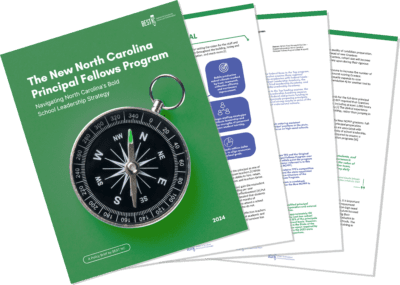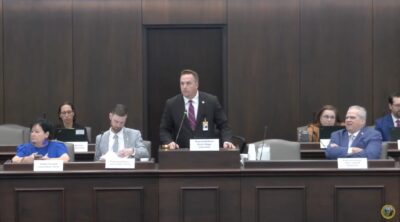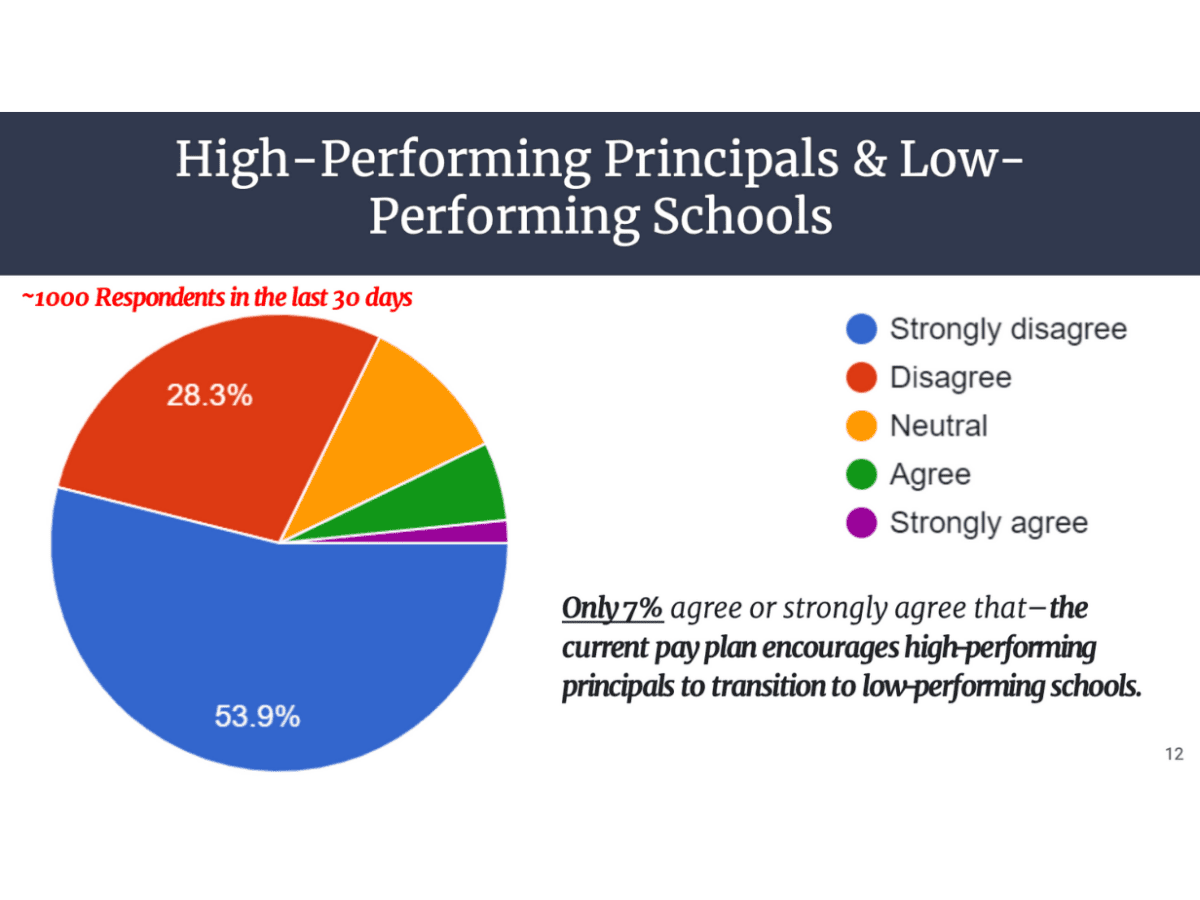
|
|
Two of North Carolina’s 2023 Regional Principals of the Year asked lawmakers during a House education reform meeting on Monday to revise the state’s plan for paying school principals. Among other things, two representatives from the North Carolina Principals and Assistant Principals Association (NCPAPA) said the current plan is too tied to test scores — discouraging some principals from serving in low-performing or high-poverty schools.
Currently, the state’s principal salary schedule is tied to Average Daily Membership (ADM) and school growth. In 2018, the state updated the principal pay scale to increase pay. On Monday, presenters Dr. John Lassiter and Ashley Faulkenberry told lawmakers that NCPAPA’s requested revisions build off that scale.
“It is not focused on significant increases in pay but on tweaking the compensation model to provide greater pay stability and to keep outstanding principals in their schools longer,” the presentation says. “The current plan was a step in the right direction for overall principal compensation. However, the plan had a few unintended consequences.”
Those consequences, according to the presentation, include:
- Big swings in pay based on many factors beyond the principal’s control.
- Not considering the complexity of the school.
- De-incentivizing outstanding assistant principals from aspiring to become principals and stay in the field.
NCPAPA’s proposed plan would add a retention bonus and include factors such as how many multi-language and students experiencing homelessness a school has, in addition to school size and performance.
“We recognize that there’s a sense of urgency to support North Carolina schools, and to ensure strong school leadership is in place. Because we know that school leadership is one of the top two leading factors impacting overall school success,” said Lassiter, the principal of Hertford Grammar School in Perquimans County Schools. “Today, we want to look at adding a few complexity factors to the principal compensation plan that look at the challenging job that a principal has in a more unique way. … We’re asking to redeploy some of the resources so that there’s more stability in pay.”
Here is a look at the current principal pay plan, followed by a look at the proposal presented to lawmakers on Monday.
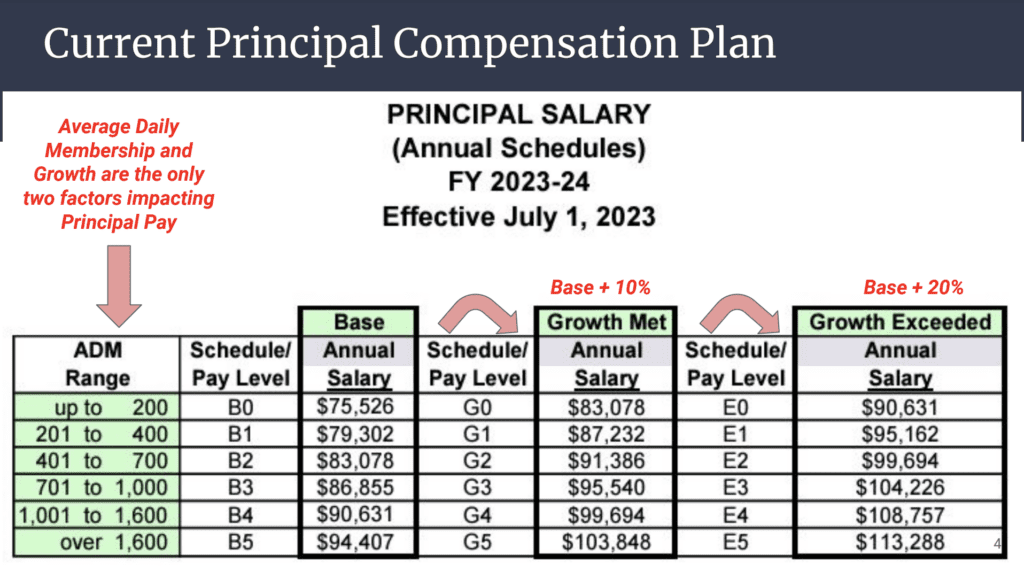
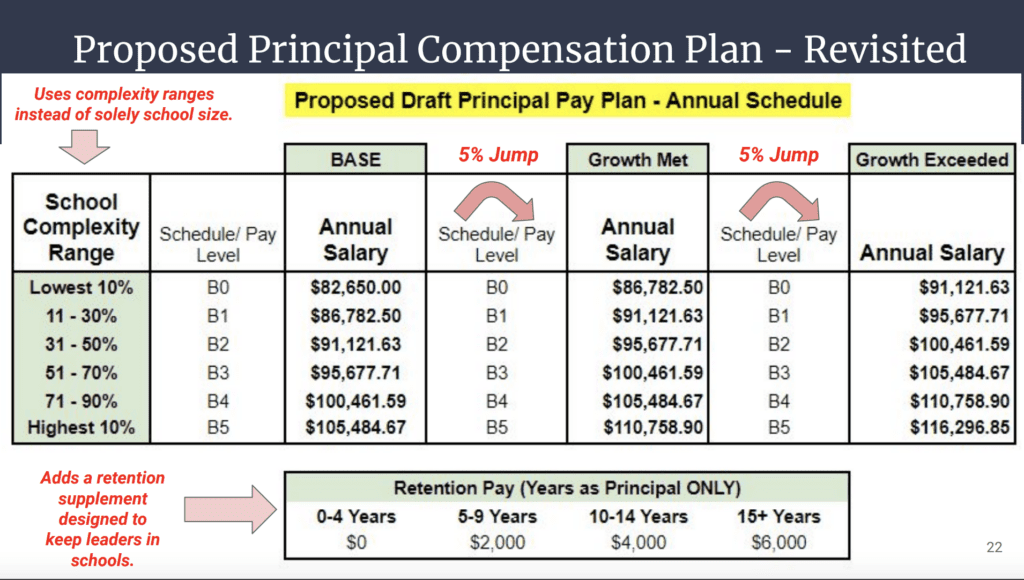
Not removing performance pay, but changing how it’s calculated
Roughly one out of five N.C. principals (21%), agree or strongly agree that performance-based pay in the current pay plan makes up a fair portion of a principal’s total salary, according to a NCPAPA survey.
The current growth score metric also does not factor in scores on science and history tests, the presentation said, or exam scores in career and technical education and dual-enrollment courses.
“We don’t recommend removing performance pay from principal compensation. We know that it’s an important part of the work that we do,” Lassiter told lawmakers. “But we do want to share that the majority of principles are saying that it’s not a fair portion of how they’re compensated.”
Currently, principals get an additional 10% if they meet EVAAS growth targets and 20% for exceeding that target. The principals’ plan presented on Monday calls for reducing that to 5% and 10%, respectively.
The money not spent on growth scores would then go toward increasing the base principal pay, per the presentation. This is intended to stabilize principal pay while keeping the current structure of the plan in place, Lassiter said.
“Our current system ranks growth of all schools with no consideration of complexity or disadvantagement,” the presentation says. “This graph (below) shows the correlation between social economic status of the student population and the school’s ability to exceed growth.”
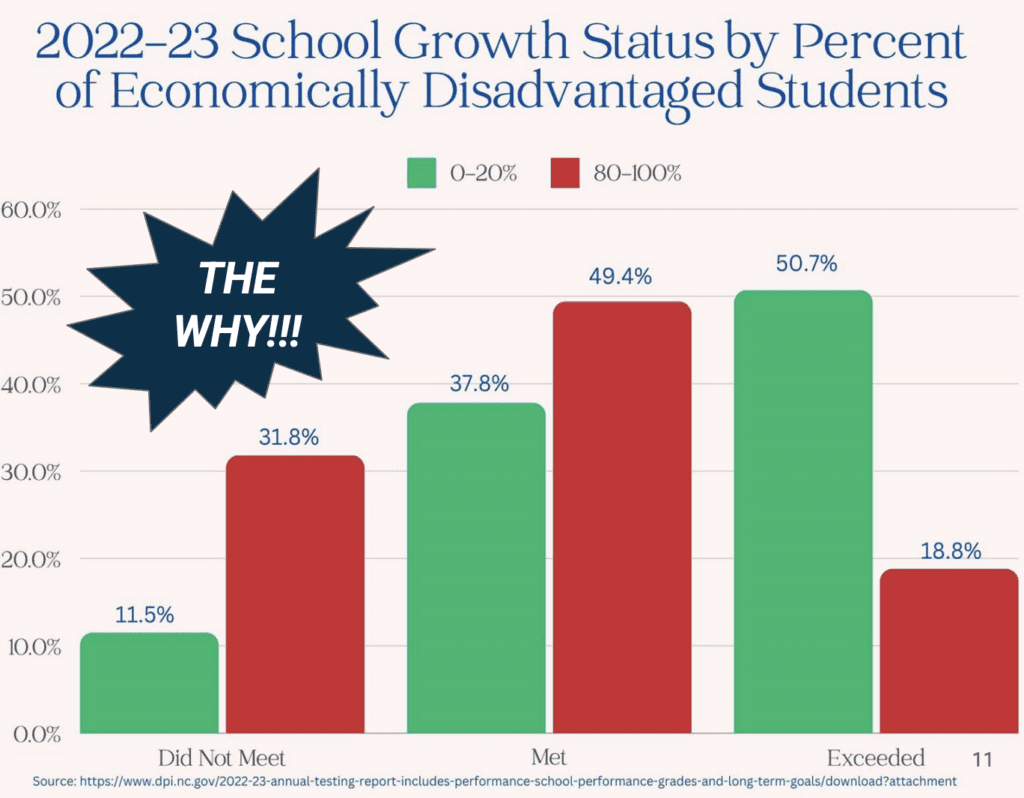
“This really proves that principals who serve more complex schools have unique challenges to overcome to accomplish similar results to schools located in more affluent areas across the state,” said Faulkenberry, the principal of Trent Park Elementary in Craven County Schools.
Increasing principal retention
Nationally, 1 in 5 principals leave the profession each year, the presentation said. In North Carolina, that number is closer to 1 in 4.
“The problem of retention is greatest at high-poverty schools where nearly 30 percent of principals leave their school,” the presentation says. “As principals become more experienced, research shows they tend to move to lead schools with fewer complexity factors, schools that serve high-income areas with high-achieving students.”
Retention matters, as research shows that school principals greatly impact the schools they lead. According to a 2021 report from the Wallace Foundation, principals “contribute to important outcomes like student achievement, reduced absenteeism, and teacher retention.”
To help combat low principal retention, NCPAPA proposes adding the following retention pay bonuses:
- $2,000 for 5-9 years as a principal.
- $4,000 for 10-14 years as a principal.
- $6,000 for 15+ years as a principal.
The proposed model also seeks to increase principal retention by establishing a complexity model that considers more than just school size. The lowest “complexity tier” would start at $82,650 and the highest would start at $105,484.67.
“More complex schools equals high stress, higher burnout, more turnover, and less stability for schools,” Faulkenberry said. “Simply put, more complex schools are more difficult to lead.”
Here is a look at some of the factors the proposal would include:
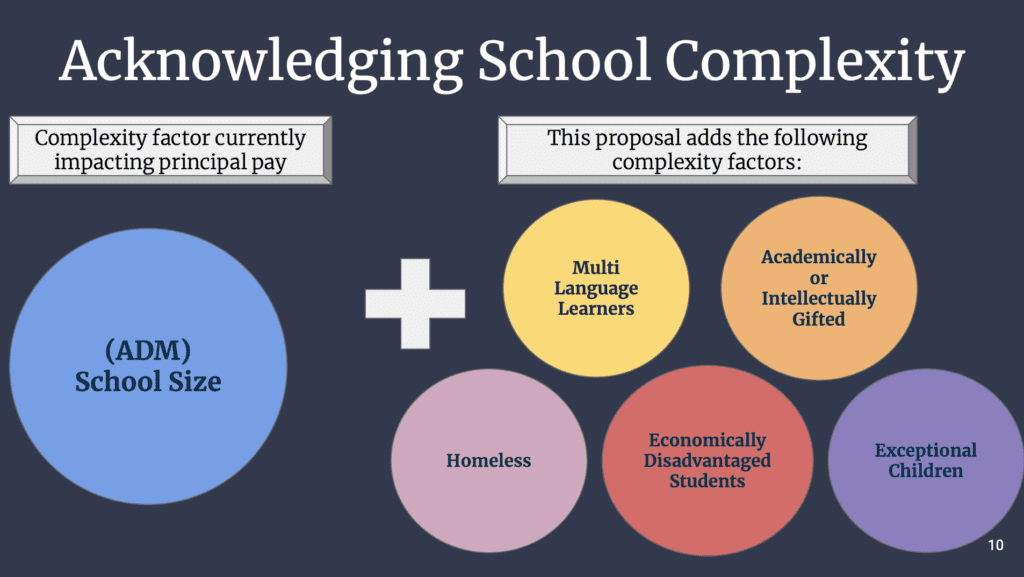
Only 7% of N.C. principals agree or strongly agree that the current pay plan encourages high-performing principals to transition to low-performing schools, per the NCPAPA survey.
Accounting for factors beyond school size would encourage more principals to stay at high-poverty schools, Lassiter and Faulkenberry said.
They also spoke about the need to create a stronger “compensation progression” in North Carolina schools, citing a decreasing pool of candidates considering principalship. According to the NCPAPA survey, less than 15% of principals agree or strongly agree that the current pay plan encourages school leaders to transition into the role of the principal.
The principals’ proposal would address this problem, the presentation says, by “linking all school employees to one salary scale while ensuring that the principal is the highest paid employee in the building.” The proposed revisions start principal pay at the top teacher pay schedule, plus 25%.
“If we do not honor principal experience as part of the new proposal, we fear that the statistics will only become a greater concern across the state, further impacting our education future workforce,” Faulkenberry told lawmakers.
What did lawmakers say?
NCPAPA is asking state lawmakers to modify the principal pay plan in 2024 to “enhance recruitment, increase stability, add school complexity factors, and recognize experienced leadership.”
“It has never been more important to keep outstanding principals in their schools,” the presentation says.
Rep. Phil Shepherd, R-Onslow, spoke about the importance of having school principals who are well known and have a strong reputation in the community.
Rep. Henry Warren, R-Rowan, asked how the proposed plan would calculate complexity tiers.
“Each of these students would count for one point in each of these different complexity factors,” Faulkenberry said. “And then you would put all of those points into a bucket, and then that would tier those students in the pay plan.”
Warren also asked how much an impact shifting student enrollment has had on principal pay. He specifically mentioned an increase in homeschooling and families using Opportunity Scholarships to enroll their children in private school.
Faulkenberry and Lassiter said that impact is felt the strongest in smaller, transient districts. Faulkenberry clarified that school size is still considered a factor under the plan, but now one of many.
Rep. Hugh Blackwell, R-Burke, said “bringing in more complexity factors is appropriate,” but questioned reducing incentives for growth in test scores.
“If our approach is to try to find the principles that are effective, it seems to me it just simply gives you higher pay for having a tough situation but doesn’t necessarily mean you’re effective in that role,” Blackwell said.
Committee Co-Chair Rep. John Torbett, R-Gaston, said the fiscal department will work to provide a “rough estimate” on how much the principals’ proposal would cost to implement.
Rep. Brian Biggs, R-Randolph, said lawmakers should continue discussing the principals’ proposal.
“We’ve got to look at this,” said Biggs, who co-chairs the education reform committee. “Because a lot of principals that are in tough situations are superstars, but they’re not getting paid like they’re superstars because of the situation that they’re put in.”
The House Select Committee on Education Reform is scheduled to hold its final meeting of the short session on March 25. Torbett said the committee plans to issue their final report then.



